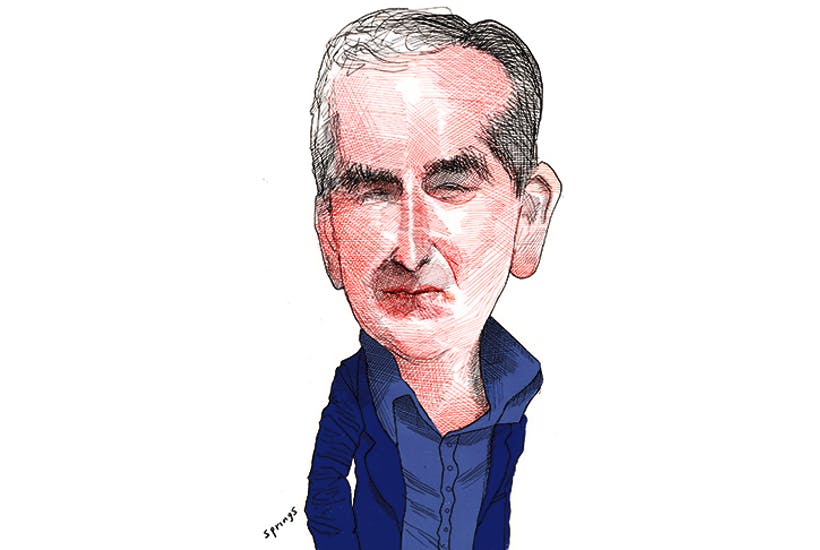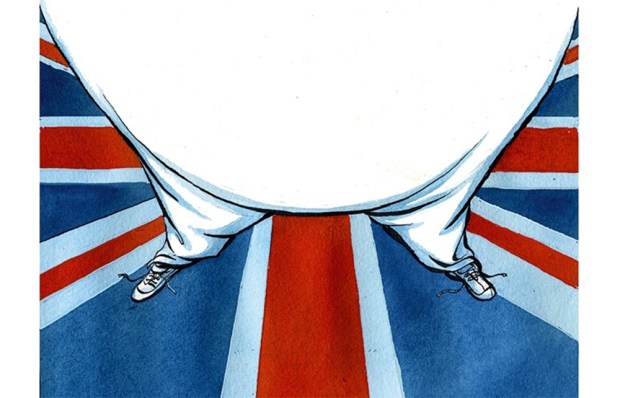The Sunday Times’s literary editor Andrew Holgate recently tweeted the news that Robert Harris’s latest thriller had entered the bestseller list at No. 2: ‘Pipped to the post by Ken Follett.’ Harris retweeted it: ‘Well done Ken. You bastard.’
Pipped to the post only by Follett. That’s the level Harris is at now. Even before it hit the shops, his novel was being chased for film rights by two studios. Harris is one of that small and enviable group of journalists who became novelists — and made it big instantly. His first book, the alternative history story Fatherland, set in a Germany in which Hitler won the war, was bought on the basis of the idea alone and became a name-establishing bestseller.
With his new novel, Munich — set amid the 1938 appeasement crisis — Harris returns to Nazi Germany for the first time in 25 years. When we sit down together at The Spectator, I go highbrow from the off and quote Indiana Jones at him: ‘Nazis: I hate these guys.’ What made him return to the scene?
‘I’ve consciously waited 25 years to go back into that world,’ he says. ‘I didn’t want to get myself typecast as a novelist of the second world war. But I’ve long hankered after writing a novel about the Munich Agreement: the moral compromises, the drama of it, more from the British perspective than the German, and that was really my way into it.’
A pleasure of Munich, for the reader, is the way that Harris inserts his fictional protagonists — the civil servant, Hugh Legat, and an old university chum called Paul Hartmann who now works as a diplomat on the German side — into the interstices of the historical record. Legat, for instance, takes the place on the flight to Munich of a historical figure, Cecil Syers: ‘He’s bumped off the flight at the last minute in favour of my man… “Terribly sorry about this,” and Syers says, “Well your German is much better than mine, it’s quite all right, old chap!” I enjoy doing that sort of thing.’
Harris has an ‘it could have happened’ rule for himself. “I have a sort of manic OCD quality when it comes to facts,’ he says. ‘I need to feel that the book is true for me to be able to write it. The New York Times, for instance, said that the weather was very hot and sticky in Munich at the time. It was the climax of the Oktoberfest — I’ve never really seen that mentioned in any book about Munich — so the streets were full of people in lederhosen and dirndls, hundreds, thousands of them.
‘When Chamberlain went by they were cheering and waving and there was a oompah band outside his hotel playing “The Lambeth Walk”. That sort of detail, which a historian probably wouldn’t have time to bother with — that’s meat and drink for me.’
Around his fictional plot — which involves Legat and Hartmann working together covertly to get Chamberlain to see the truth about Hitler’s intentions — are the larger machinations of history. There’s a sympathetic portrait of Chamberlain himself — ‘much tougher than people realise, a wiry, obstinate fellow. Not at all the weakling with the umbrella that we hear about these days. And he really did change the course of history’; a silky showing for Lord Halifax (‘the Holy Fox… doubling his tracks’); and a figure with a ‘thin-lipped smile’ called Dunglass — whom history knows (though Harris soft-pedals the joke) as Sir Alec Douglas-Home. Harris drops in that he once interviewed Sir Alec, late in life, about being in the room with Hitler and what Chamberlain said about the famous memorandum he was to wave from the steps of his plane.
Harris is a fiction writer with a strong attraction to history — and a thriller writer unafraid to pick a plot where everyone knows what’s going to happen in the end. Doesn’t that present a problem? He doesn’t think so. ‘The most successful postwar thriller was The Day of the Jackal,’ he points out. ‘Of course we all know De Gaulle was not assassinated, but it doesn’t stop it being a riveting book. There’s endless fascination with the Titanic. And I wrote a novel about Pompeii. We all know the Titanic sinks and Pompeii is destroyed — but waiting for it gives you the drama. This is really like Greek tragedy. You know what’s going to happen: it’s the progress towards it which is riveting.’
Before he was a novelist Harris was a political columnist. The book’s coda has a character who talks about the power of ‘unreason’. I ask the obvious question: does he see any parallels with our so-called ‘post-truth’ era? ‘I finished the novel and then turned on the television and there was the spectacle of swastikas being paraded through a southern American city and the American President surprisingly equivocal in his condemnation of these neo-Nazis.
‘Living in Goebbels’s propaganda culture, at one point one of the characters says what he enabled the Germans to do was not to have to think. You got spoon-fed the news that you wanted and it was all very comforting. One gets that now: everyone can get the news they want. They don’t have to think: they are just comforted in their prejudices, and there is a totalitarian vibe in the air.
‘Why did I devote a decade of my life to writing about Cicero and the collapse of the Roman Republic? Even at the time I thought it was a strange occupation. Afterwards though, when you see unscrupulous multimillionaires whipping up the mob to attack the elite and the whole democratic structure crumbling under that pressure, you suddenly start to think: oh, maybe that was why I was doing it.’
Got something to add? Join the discussion and comment below.
Get 10 issues for just $10
Subscribe to The Spectator Australia today for the next 10 magazine issues, plus full online access, for just $10.
You might disagree with half of it, but you’ll enjoy reading all of it. Try your first month for free, then just $2 a week for the remainder of your first year.















Comments
Don't miss out
Join the conversation with other Spectator Australia readers. Subscribe to leave a comment.
SUBSCRIBEAlready a subscriber? Log in